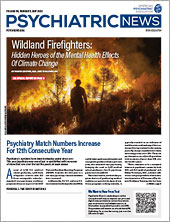Primary Care Visits Increasingly Address Mental Health
“Given the significant prevalence of mental health diagnoses, the impact of comorbid mental health conditions on utilization, and shortages of mental health professionals, these findings have important implications for the future organization and financing of U.S. primary care,” wrote the researchers from Brigham and Women’s Hospital in Boston and colleagues.
The researchers analyzed National Ambulatory Medical Care Survey data collected between 2006 and 2018. This included data from 109,898 outpatient care visits by adults from across the United States, of which 81% involved a primary care physician.
In 2006, 3.4% of primary care visits involved a mental health concern as the primary issue, and 10.7% addressed a mental health concern (including those not listed as primary diagnosis). By 2018, 6.3% of visits involved a mental health concern as the primary issue, and 15.9% addressed a mental health concern. Over time, a higher proportion of visits involved anxiety and substance use concerns, while the proportion of visits involving depression or serious mental illness decreased.
Patients who were younger, female, insured by Medicare or Medicaid, or visiting their regular physician were more likely to discuss a mental health concern. Black patients were 40% less likely than White patients to have a primary care visit with a mental health concern; similarly, Hispanic patients were 40% less likely to have a primary care visit with a mental health concern than non-Hispanic patients.
“These findings emphasize the need for payment and billing approaches … as well as organizational designs and supports … that enable primary care physicians to adequately address mental health needs,” the authors wrote.
Comorbidities Linked to Readmission Risk for Cannabis Use
Individuals with cannabis use disorder are more likely to seek additional inpatient or outpatient care for the disorder if they have a psychiatric comorbidity, a study in Addiction has found. Lower educational attainment was also a notable risk factor for readmission.
These findings come from an analysis of Swedish health registers conducted by investigators at the Karolinska Institutet in Stockholm. The study included 12,143 individuals aged 17 and older born in Sweden who received an initial diagnosis of cannabis use disorder between 2001 and 2016. The researchers examined the rates of subsequent inpatient or outpatient visits for cannabis use disorder at least six months after diagnosis—a period they thought might best “capture visits that could be indicative of relapses or initiations of new courses of treatment,” they wrote.
About 23% of those in the study were seen in an inpatient or outpatient setting for cannabis use disorder at least six months after their first diagnosis; most of these visits took place in outpatient settings. The investigators found that individuals with nine or less years of completed schooling were at a 50% increased risk of readmission compared with individuals with 12 or more years of schooling. Similarly, those with any other psychiatric disorder had a 50% increased risk of readmission compared with those without a comorbidity. Those with a psychotic disorder or a personality disorder were found to be at greatest risk (81% increased risk and 69% increased risk, respectively).
Additional analysis suggested the increased risk of readmission was primarily seen in adults aged 18 to 35.
Timely Follow-Up MH Care Missing for Many Children Discharged From ED
Children seen in an emergency department for a mental health condition are not receiving follow-up care within 30 days of discharge, suggests a
study published in
Pediatrics.
“Timely outpatient follow-up after a MH ED [mental health emergency department] discharge may facilitate continuity and ongoing engagement in MH [mental health] care,” wrote the researchers at the Ann & Robert H. Lurie Children’s Hospital of Chicago and colleagues.
They conducted a retrospective study of 28,551 children enrolled in Medicaid who were aged 6 to 17 and had at least one mental health–related emergency department discharge between January 2018 and June 2019. They assessed the rate of an outpatient mental health visit at both 7- and 30-days postdischarge, as well as the rates of emergency department returns or hospitalizations over the next six months.
Overall, 31.2% and 55.8% of children had an outpatient mental health visit within 7 and 30 days, respectively. Non-Hispanic Black children had slightly lower odds of a follow-up visit than non-Hispanic White children at both time points.
More than one-quarter of the children assessed returned to the emergency department or were hospitalized within six months. Interestingly, children who received outpatient mental health care within 30 days were slightly more likely than those who did not to seek a follow-up mental health visit at the emergency department or hospital care.
“Unaccounted clinical severity may partially explain these findings because children with greater clinical severity may be scheduled for more frequent follow-up visits or families may be more likely to attend visits,” the researchers wrote. “Outpatient follow-up may also directly result in increased acute care utilization, if symptoms are recognized during follow-up visits (such as worsening of suicidal ideation) that prompt appropriate referrals.”
Omega-3 Fatty Acid Deficiency May Contribute to Depression
The imbalance of omega-6 and omega-3 fatty acids may contribute to depression, according to a
study published in
Biological Psychiatry.
“These findings provide further support for the causal involvement of fatty acids in MDD [major depressive disorder],” wrote the researchers from the University of Edinburgh in Scotland and colleagues.
The group analyzed data in the U.K. Biobank—a comprehensive biological repository of over 500,000 adults from across the United Kingdom. A subset of U.K. Biobank participants (8,840 with a history of major depression and 20,917 without) were screened for 249 metabolic biomarkers at the time of study enrollment.
The researchers found that even after adjusting for such variables as smoking or obesity levels, people with elevated omega-6: omega-3 ratios were more likely to have depression as ratios increased; however, those with depression were not more likely to have elevated ratios of these fatty acids. In contrast, people with elevated omega-3 levels or elevated Docosahexaenoic Acid (a type of omega-3) had lower incidences of depression.
“Our findings suggest that decreased Docosahexaenoic Acid and increased Omega-6: Omega-3 fatty acids ratio may be causally related to MDD,” the authors concluded. “These findings provide further support for the causal involvement of fatty acids in MDD.” ■




